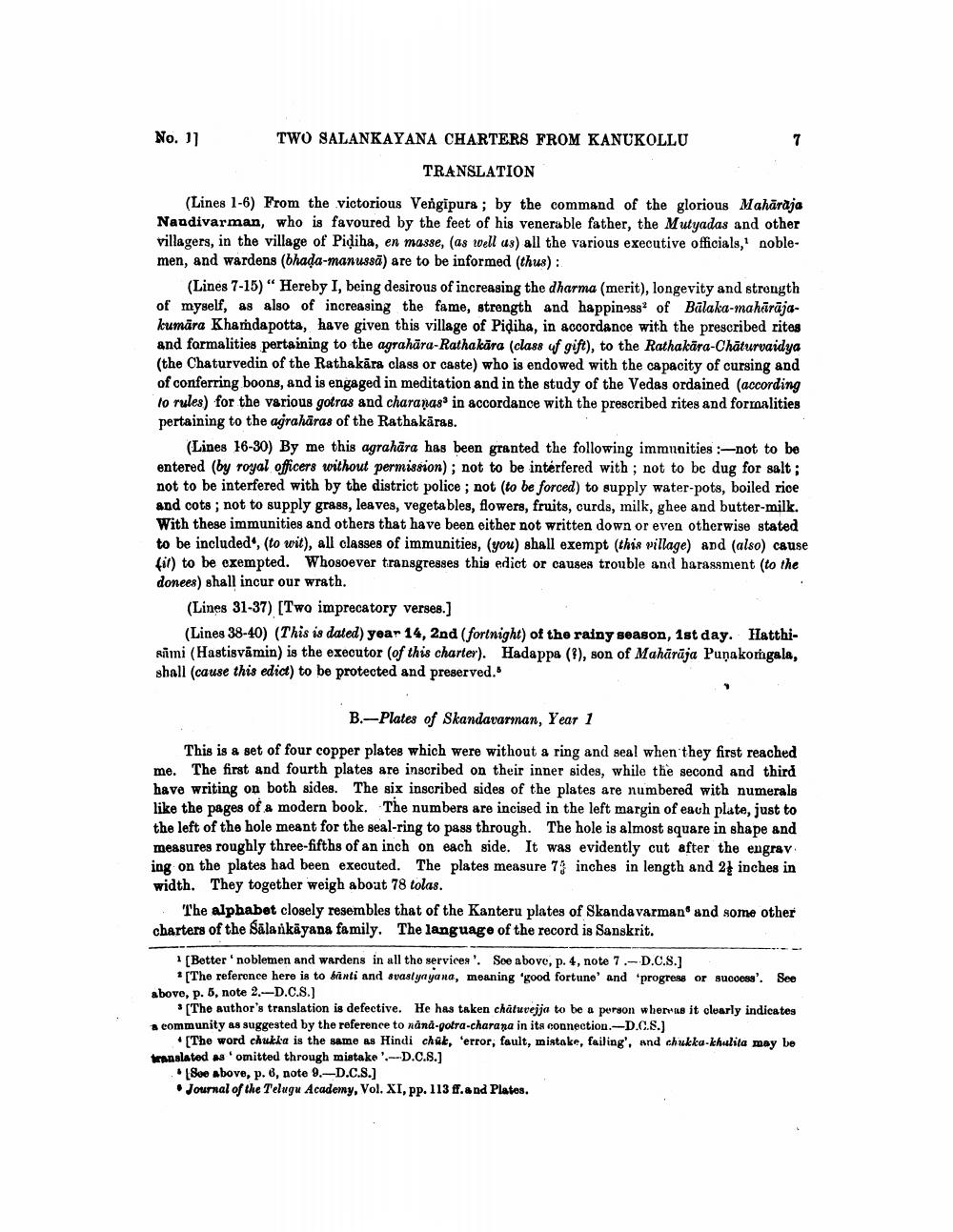________________
No. 11
TWO SALANKAYANA CHARTERS FROM KANUKOLLU
TRANSLATION
(Lines 1-6) From the victorious Vengipura ; by the command of the glorious Mahāraja Nandivarman, who is favoured by the feet of his venerable father, the Mutyadas and other villagers, in the village of Pidiha, en masse, (as well us) all the various executive officials, noblemen, and wardens (bhada-manussä) are to be informed (thus) :
(Lines 7-15) " Hereby I, being desirous of increasing the dharma (merit), longevity and strength of myself, as also of increasing the fame, strength and happiness of Būlaka-mahairājakumāra Khandapotta, have given this village of Pidiha, in accordance with the prescribed rites and formalities pertaining to the agrahāra-Rathakāra (class of gift), to the Rathakara-Chāturvaidya (the Chaturvedin of the Rathakāra class or caste) who is endowed with the capacity of cursing and of conferring boons, and is engaged in meditation and in the study of the Vedas ordained (according to rules) for the various gotras and charañas in accordance with the prescribed rites and formalities pertaining to the agrahāras of the Rathakaras.
(Lines 16-30) By me this agrahāra has been granted the following immunities :-not to be entered (by royal officers without permission); not to be interfered with ; not to be dug for salt; not to be interfered with by the district police ; not (to be forced) to supply water-pots, boiled rice and cots ; not to supply grass, leaves, vegetables, flowers, fruits, curds, milk, ghee and butter-milk. With these immunities and others that have been either not written down or even otherwise stated to be included", (to wit), all classes of immunities, (you) shall exempt (this village) and (also) cause fit) to be exempted. Whosoever transgresses this edict or causes trouble and harassment (to the donees) shall incur our wrath.
(Lines 31-37) [Two imprecatory verses.]
(Lines 38-40) (This is dated) year 14, 2nd (fortnight) of the rainy season, 1st day. Hatthirimi (Hastisvāmin) is the executor (of this charter). Hadappa (?), son of Mahārāja Puņakomgala, shall (cause this edict) to be protected and preserved.
B.- Plates of Skandavarman, Year 1 This is a set of four copper plates which were without a ring and seal when they first reached me. The first and fourth plates are inscribed on their inner sides, while the second and third have writing on both sides. The six inscribed sides of the plates are numbered with numerals like the pages of a modern book. The numbers are incised in the left margin of each plate, just to the left of the hole meant for the seal-ring to pass through. The hole is almost square in shape and measures roughly three-fifths of an inch on each side. It was evidently cut after the engrav ing on the plates had been executed. The plates measure 7inches in length and 21 inches in width. They together weigh about 78 tolas.
The alphabet closely resembles that of the Kanteru plates of Skanda varman and some other charters of the Salankäyana family. The language of the record is Sanskrit.
[Botter'noblemen and werdens in all the services'. Soe above, p. 4, note 7.-D.C.S.)
*[The reference here is to binti and svaslynyana, meaning 'good fortune' and 'progress or success'. See above, p. 5, note 2.-D.C.S.)
* [The author's translation is defective. He has taken châturejja to be a person where it olvarly indicates * community a suggested by the reference to nana-gotra-charana in its connection.-D.C.S.)
· [The word chukka is the same as Hindi chük, 'error, fault, mistake, failing'. And chukka-khulita may be translated as omitted through mistake'.D.C.S.)
1800 above, p. 8, note 9.-D.C.S.) Journal of the Telugu Academy, Vol. XI, pp. 113 ff.and Plates.




